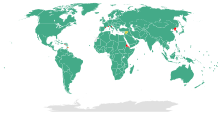UNCAC

Signatories (orange) and Ratifications (green) of the treaty.
|
|
| Drafted | 31 October 2003 |
|---|---|
| Signed | 9 December 2003 |
| Location | Mérida and New York |
| Effective | 14 December 2005 |
| Condition | 30 ratifications |
| Signatories | 140 |
| Parties | 181 |
| Depositary | Secretary-General of the United Nations |
| Languages | Arabic, Chinese, English, French, Russian and Spanish |
The United Nations Convention against Corruption (UNCAC) is a multilateral treaty negotiated by member states of the United Nations (UN) and promoted by the UN Office on Drugs and Crime (UNODC). It is the only legally binding international anti-corruption agreement. UNCAC requires state parties to the treaty to implement several anti-corruption measures that focus on five main areas: prevention, law enforcement, international cooperation, asset recovery, and technical assistance and information exchange.
UNCAC's goal is to reduce various types of corruption that can occur across country borders, such as trading in influence and abuse of power, as well as corruption in the private sector, such as embezzlement and money laundering. Another goal of the UNCAC is to strengthen international law enforcement and judicial cooperation between countries by providing effective legal mechanisms for international asset recovery. The Conference of the States Parties to the UNCAC provides participating countries with resources and assistance to improve implementation of the obligations set forth by the Convention.
UNCAC was adopted by the United Nations General Assembly on 31 October 2003 by Resolution 58/4. It was opened for signature in Mérida, Yucatán, Mexico, from 9–11 December 2003 and thereafter at UN headquarters in New York City. It was signed by 140 countries. As of December 2016, there are 181 parties, which includes 177 UN member states, the Cook Islands, the Holy See, the State of Palestine, and the European Union.
...
Wikipedia
